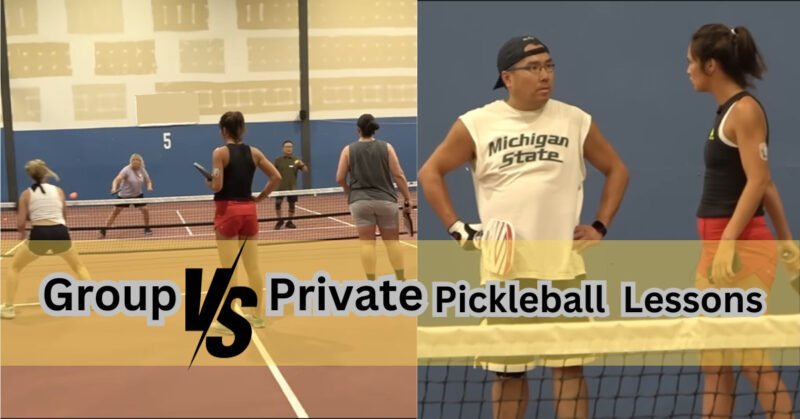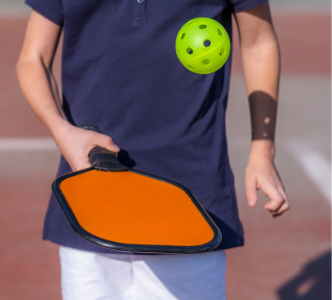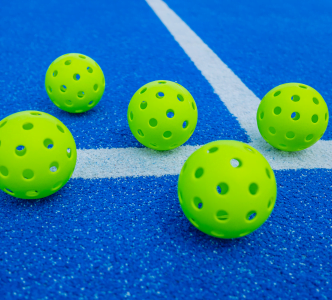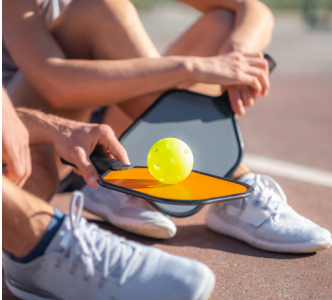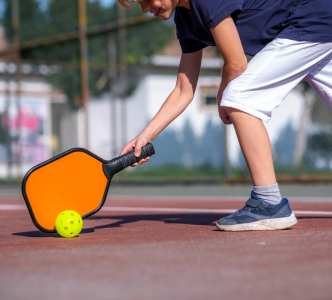You can choose the best path to advancing your pickleball skills: a comparison of group vs private pickleball lessons tailored for every player’s journey. This guide explores the advantages and challenges of both, helping you make an informed decision based on your goals, budget, and learning style.
Key Takeaways:
- Group lessons offer affordability and a social learning environment but may lack personalized attention.
- Private lessons provide tailored coaching and flexible scheduling at a higher cost, with focused skill improvement.
- Choosing between group and private lessons depends on individual preferences, goals, and financial considerations.
What’s the difference between group and private pickleball lessons, and which is better for me?
The choice between group and private pickleball lessons hinges on your learning goals, budget, and preference for social interaction vs personalized attention. Group lessons are cost-effective and offer a communal learning experience, while private lessons are pricier but provide customized coaching and flexibility. The better option depends on your personal needs and how you prefer to learn and improve your game.
Understanding Pickleball Lessons
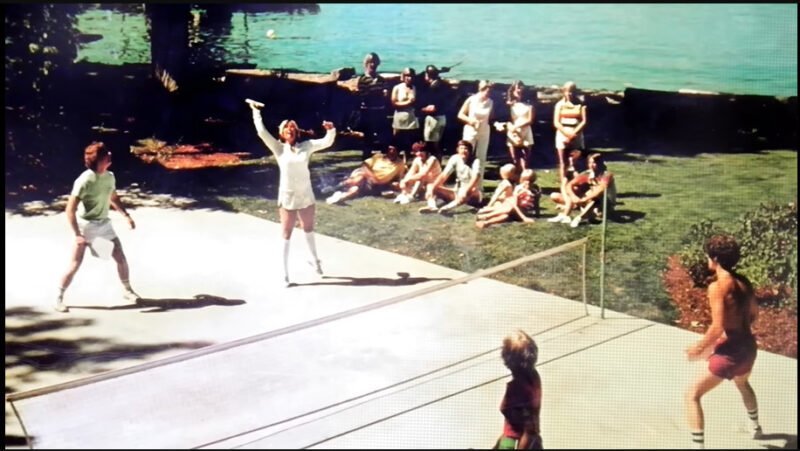
Pickleball, a sport that originated in the mid-1960s as a backyard pastime, has evolved into a global phenomenon. Alongside its rising popularity, the approach to pickleball coaching has undergone a significant transformation. From informal tips among friends to structured coaching programs, the journey mirrors the sport’s growth and diversification.
Initially, pickleball lessons were more about sharing the fun than serious coaching. As the sport gained traction, enthusiasts and early adopters began to form more structured playing and learning environments. Today, pickleball coaching is a professional domain, with certified coaches, sophisticated teaching methodologies, and a focus on strategic gameplay.
The Current State of Pickleball Coaching
Modern pickleball coaching is as diverse as its player base. It ranges from community-based group lessons in local parks to high-intensity private training sessions with professional coaches. This diversity reflects the sport’s inclusive nature, catering to players of all ages, from children picking up their first paddle to seniors enjoying an active lifestyle.
Coaching methods have also evolved. Today’s pickleball coaching is not just about hitting the ball; it involves physical conditioning, mental strategy, game tactics, and understanding the psychology of the sport. This holistic approach aims to develop well-rounded players who can enjoy the game and compete effectively.
Group vs Private Pickleball Lessons
The two primary coaching formats in pickleball are group and private lessons. Each has its methodology, atmosphere, and learning dynamics.
- Group Lessons: These are typically conducted with many students and one or more coaches. They are structured around common skill development, drills, and gameplay, emphasizing group dynamics and peer interaction.
- Private Lessons: In contrast, private lessons offer one-on-one coaching, where the instruction is highly personalized. These sessions focus on individual strengths and weaknesses, providing tailored strategies and feedback.
If you are wondering whether these pickleball pieces of training will provide value to your skill or not I recommend you to read our comprehensive guide about, Pickleball clinics and workshops. Are they worth it or not you will discover each point and you can make a better decision.
Group Pickleball Lessons
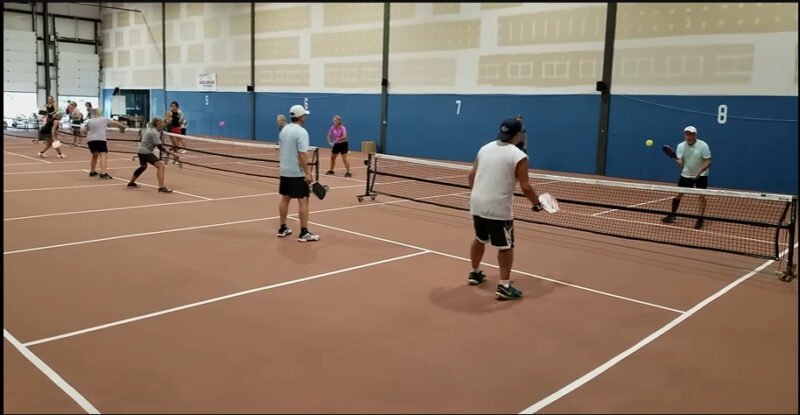
Overview
Group pickleball lessons bring together players of varying skill levels under the guidance of a coach or instructor. Typically held in local parks, community centers, or sports clubs, these sessions can range from small groups of four to larger classes with ten or more participants. The structure of these lessons often includes a mix of drills, practice games, and group activities designed to improve general playing skills and understanding of the game.
Pros of Group Lessons
Social Aspect
One of the most significant benefits of group lessons is the opportunity to meet and interact with other pickleball enthusiasts. This social environment not only makes learning more enjoyable but also helps build a sense of community among players.
Cost-Effectiveness
Group lessons are generally more affordable than private sessions. This makes pickleball more accessible to a wider audience, allowing more people to learn and enjoy the game without a hefty financial commitment.
Exposure to Diverse Playing Styles
In a group setting, players are exposed to various playing styles and strategies. This diversity can be incredibly beneficial, offering insights into different ways of approaching the game and handling various scenarios on the court.
Motivation and Competition
Learning in a group can foster a healthy sense of competition. Watching peers progress and succeed can be motivating, pushing players to improve their own game.
Cons of Group Lessons
Less Personalized Attention
With a single coach managing multiple students, individual attention can be limited. This might lead to slower progress for some players, especially those who may need more focused guidance to overcome specific challenges.
Varying Skill Levels
Group lessons often comprise players with mixed abilities. While diversity is beneficial, significant differences in skill levels can make it challenging to tailor lessons that are equally effective for all participants.
Scheduled Times
Group lessons are typically scheduled by the coach or the facility, which might not align with every participant’s availability. This lack of flexibility can be a downside for players with busy or irregular schedules.
Private Pickleball Lessons
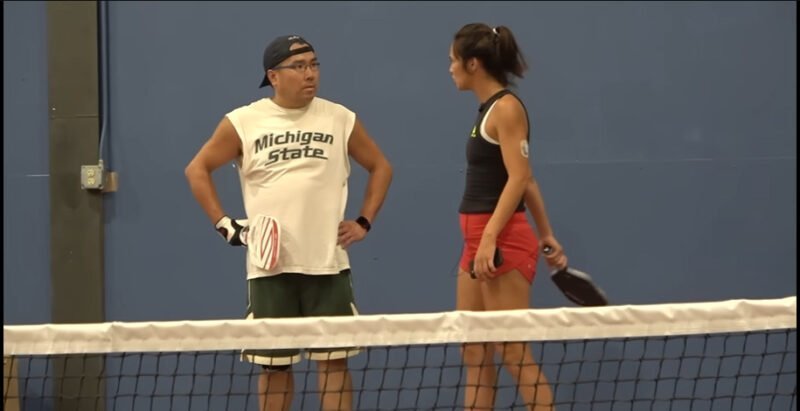
Overview
Private pickleball lessons provide a one-on-one coaching experience, tailored to the individual’s skill level, learning style, and specific goals. These sessions are highly personalized, focusing on the player’s unique strengths and areas for improvement. Conducted at mutually agreed times, private lessons offer flexibility and a more focused learning environment.
Pros of Private Lessons
Personalized Attention
The hallmark of private lessons is the individualized coaching approach. Instructors can closely assess your technique, offer specific feedback, and work intensively on particular aspects of your game, such as footwork, shot accuracy, or strategic play.
Flexible Scheduling
Unlike group lessons, private sessions can be scheduled at times that are most convenient for the student. This flexibility is ideal for those with busy schedules or specific training requirements.
Accelerated Learning
With undivided attention from the coach, players often experience faster progress. The intensive, personalized training can quickly address weaknesses and refine strengths, leading to rapid improvement in skills.
Cons of Private Lessons
Higher Cost
Personalized attention comes at a premium. Private lessons are significantly more expensive than group sessions, which might be a limiting factor for some players.
Limited Social Interaction
While private lessons offer focused training, they lack the social and competitive aspects of group lessons. This absence of peer interaction can be a downside for those who enjoy the communal aspect of learning.
Over-reliance on Instructor
In a one-on-one setting, there’s a risk of becoming overly dependent on the coach’s guidance, potentially limiting the development of independent game strategies and problem-solving skills on the court.
After exploring the history and current trends in pickleball coaching, it’s important to consider the practical aspects of engaging in lessons. For more detailed information on the financial aspect of pickleball coaching, check out our comprehensive guide on the cost of pickleball lessons. I
Tip: If you can’t afford it you can learn by yourself too by doing pickleball self coaching from learning online resources like YouTube.
Making the Right Choice
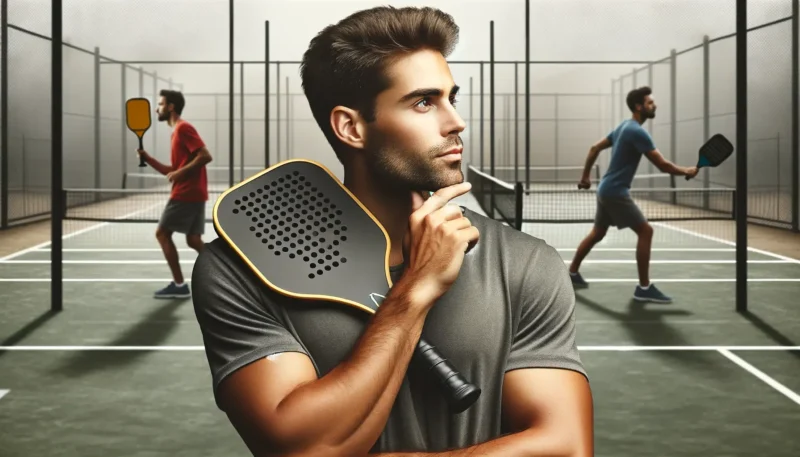
Deciding between group and private pickleball lessons hinges on several factors. This section guides players through the key considerations to make an informed decision that best suits their personal and developmental needs.
Factors to Consider
Individual Goals and Objectives
Are you looking to enjoy the social aspects of pickleball, or are you aiming for competitive play? If it’s about community and fun, group lessons might be more suitable. For those focused on rapid skill development or competitive play, private lessons could be more beneficial.
Budget and Financial Considerations
Private lessons are more expensive than group sessions. Assess your budget and how much you’re willing to invest in your pickleball education. Sometimes, a mix of both group and private lessons can provide a balance of social interaction and personalized training within a reasonable budget.
Personal Learning Style
Consider how you learn best. Do you thrive in a group environment where you can learn from observing others, or do you prefer focused, one-on-one instruction where the coach’s attention is solely on you?
Skill Level and Experience
Beginners might benefit more from the varied pace and broad focus of group lessons, while intermediate or advanced players might need the targeted approach of private lessons to refine specific skills.
Balancing Group and Private Lessons
For many players, a combination of group and private lessons can offer the best of both worlds. Group lessons provide a social, competitive environment, while private sessions offer focused skill development. This hybrid approach can be particularly effective, allowing players to enjoy the game’s social aspects while still focusing on individual skill improvement.
Tips for Optimal Learning
- Set Clear Goals: Whether it’s mastering a specific shot or improving your overall game, having clear goals can guide your choice of lesson type.
- Seek Feedback: Regular feedback from your coach, regardless of the lesson type, is crucial. It helps track progress and refines your learning path.
- Be Open to Change: As you evolve as a player, your needs might change. Be open to adjusting your mix of group and private lessons accordingly.
The Role of The Instructor in Pickleball Lessons
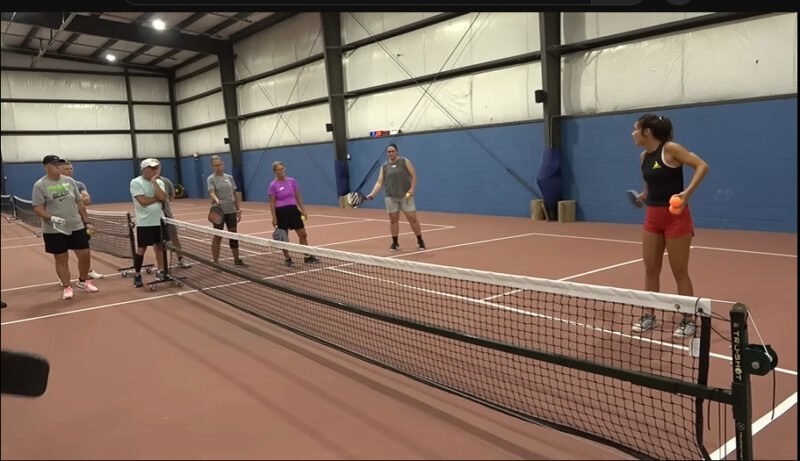
The effectiveness of both group and private pickleball lessons largely hinges on the quality and approach of the instructor. In this section, we delve into the critical role instructors play in each setting and the qualities that define an effective pickleball coach.
Qualities of a Good Pickleball Instructor
- Expertise in the Sport: A deep understanding of pickleball, its rules, strategies, and techniques is fundamental. Instructors should be adept at playing and teaching the sport.
- Ability to Communicate Clearly: Good instructors can articulate concepts clearly and concisely, making the learning process accessible and enjoyable for players of all skill levels.
- Patience and Adaptability: Each student learns differently. An effective coach demonstrates patience and adapts their teaching methods to suit individual learning styles and needs.
- Encouraging and Positive Attitude: Encouragement goes a long way in building a player’s confidence. A positive, supportive approach fosters a conducive learning environment.
- Focus on Holistic Development: Beyond just technical skills, a good coach also emphasizes the mental, strategic, and physical aspects of the game.
The Instructor’s Role in Different Settings
In Group Lessons
- Managing Diverse Skill Levels: Instructors must balance the needs of players with varying abilities, ensuring everyone benefits from the lesson.
- Fostering a Community Environment: Creating an inclusive, friendly atmosphere that encourages group interaction and learning.
- Organizing Group Activities: Designing drills and games that are engaging and beneficial for the entire group.
In Private Lessons
- Personalized Skill Analysis: Assessing and addressing the specific strengths and weaknesses of the student.
- Customized Training Plans: Developing tailored training programs to meet individual goals and objectives.
- Intensive Skill Development: Focusing on detailed aspects of the player’s game for more rapid improvement.
Importance of Continuous Learning for Instructors
Effective instructors continually update their knowledge and teaching methods. Staying abreast of the latest developments in pickleball techniques, coaching methodologies, and sports psychology is essential. This ongoing professional development ensures that they can provide the best possible training to their students.
Conclusion
The best type of pickleball lesson for you will depend on your individual needs and preferences. If you are looking for an affordable option and you enjoy the social aspects of learning, then group lessons may be a good fit for you. If you are willing to pay more for personalized instruction and flexibility, then private lessons may be a better choice. Ultimately, the best way to decide which type of lesson is right for you is to try both and see which one you prefer.
Summary of Key Points
- Group Lessons: Ideal for those seeking a social environment, affordability, and exposure to various playing styles. However, they may lack personalized attention and have less scheduling flexibility.
- Private Lessons: Provide tailored coaching, flexible scheduling, and accelerated skill development, but at a higher cost and with limited social interaction.
- The Instructor’s Role: Critical in both settings, with the effectiveness of the lessons often depending on the instructor’s expertise, communication skills, and ability to adapt to student needs.
Thank you for joining us on this deep dive into Group vs private pickleball lessons. We hope this guide has provided valuable insights to help you make the best choice for your pickleball journey. Here’s to many fulfilling games ahead, and remember, no matter how you choose to learn, the court always welcomes you with new challenges and endless fun!
FAQs
What is the difference between group and private pickleball lessons?
Group pickleball lessons typically have 3-8 students per instructor, while private lessons have only one student per instructor. Group lessons are typically more affordable, but private lessons offer more personalized instruction and flexibility.
Should beginners start with group or private pickleball lessons?
Beginners can start with either group or private pickleball lessons, depending on their individual needs and preferences. Group lessons are more affordable and offer social benefits, while private lessons provide personalized instruction and flexibility.
How to choose a coach for private pickleball lessons?
When choosing a coach for private pickleball lessons, consider their experience, qualifications, teaching style, and availability. Look for a coach who is patient, knowledgeable, and able to adapt their teaching to your individual needs.
Can I switch between group and private pickleball lessons?
Yes, you can switch between group and private pickleball lessons. If you find that one type of lesson is not meeting your needs, you can always switch to the other type.
Are private lessons worth it for intermediate pickleball players?
Private lessons can be beneficial for intermediate pickleball players who are looking to improve their skills and reach the next level. Private lessons can provide personalized instruction and feedback that can help intermediate players identify and correct weaknesses in their game.
What if I don’t improve in pickleball despite taking lessons?
If you are not improving in pickleball despite taking lessons, there are a few things you can do. First, make sure that you are practicing regularly and applying the techniques that you are learning in your lessons. Second, consider talking to your coach about your progress and see if they have any suggestions. Finally, be patient and persistent. Improvement in pickleball takes time and effort.

